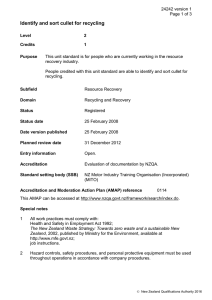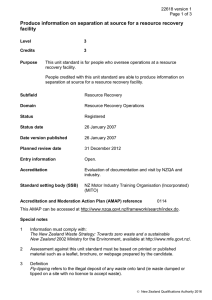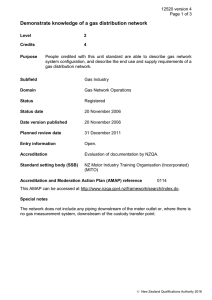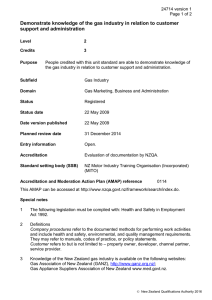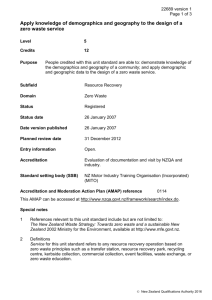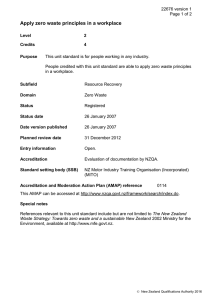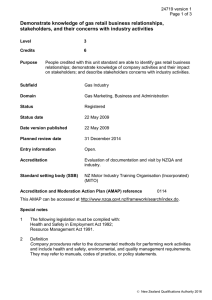Advise on zero waste options for an industry
advertisement
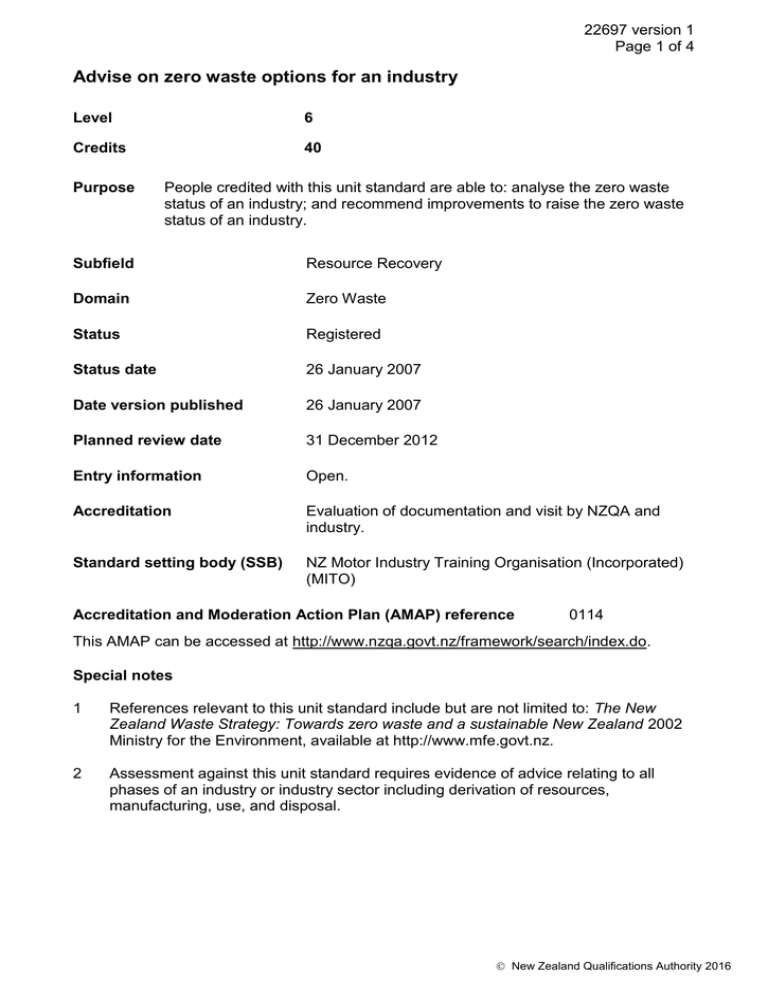
22697 version 1 Page 1 of 4 Advise on zero waste options for an industry Level 6 Credits 40 Purpose People credited with this unit standard are able to: analyse the zero waste status of an industry; and recommend improvements to raise the zero waste status of an industry. Subfield Resource Recovery Domain Zero Waste Status Registered Status date 26 January 2007 Date version published 26 January 2007 Planned review date 31 December 2012 Entry information Open. Accreditation Evaluation of documentation and visit by NZQA and industry. Standard setting body (SSB) NZ Motor Industry Training Organisation (Incorporated) (MITO) Accreditation and Moderation Action Plan (AMAP) reference 0114 This AMAP can be accessed at http://www.nzqa.govt.nz/framework/search/index.do. Special notes 1 References relevant to this unit standard include but are not limited to: The New Zealand Waste Strategy: Towards zero waste and a sustainable New Zealand 2002 Ministry for the Environment, available at http://www.mfe.govt.nz. 2 Assessment against this unit standard requires evidence of advice relating to all phases of an industry or industry sector including derivation of resources, manufacturing, use, and disposal. New Zealand Qualifications Authority 2016 22697 version 1 Page 2 of 4 Elements and performance criteria Element 1 Analyse the zero waste status of an industry. Performance criteria 1.1 The analysis identifies and explains current environmental protection initiatives for the selected industry. Range 1.2 The analysis identifies and explains operating practices in the selected industry. Range 1.3 government – national, regional, local; transition by – proactive approach, penalty, preventive measure. The analysis identifies where resource use may be reduced and illustrates these with examples and/or case studies. Range 1.6 product design and redesign, environmental software, waste minimisation assessment, product improvement analyses, risk reduction analyses, total cost assessment. The analysis identifies and explains legislation, policy, and regulation promoting transition to a sustainable society that impacts on the selected industry. Range 1.5 material handling, production scheduling, procedural measures, management, optimisation, by-product separation, material changes/substitution, product specification. The analysis identifies and explains cleaner production tools used in the selected industry. Range 1.4 environmental management systems, environmental performance evaluation, environmental reviewing and auditing, life cycle assessment, corporate social responsibility, corporate sustainability reporting. reduction by – process design modification, introduction of environmentally friendly technology, equipment replacement, automation, process control. The analysis explains barriers to the reuse of materials common to the selected industry and illustrates these with examples and/or case studies. Range barriers – variations in product quality, poor labelling of materials, price fluctuations, perceptions of quality, low volumes, high transport costs, product contamination. New Zealand Qualifications Authority 2016 22697 version 1 Page 3 of 4 Element 2 Recommend improvements to raise the zero waste status of an industry. Range recommendations may be presented as a written report, or a conference presentation, or an address to industry stakeholders. Performance criteria 2.1 Recommendations to minimise environmental degradation prioritise areas for action in accordance with The New Zealand Waste Strategy, and industry capacity for change. Range 2.2 Recommendations are made that maintain and encourage the principle of resource efficiency. Range 2.3 product design, elimination of hazardous inputs, manufacture, process design, packaging, distribution; evidence is required of at least five products. Recommendations are made that support the principle of proximity. Range 2.5 resource efficiency during – manufacture or import, distribution, use, reuse, recycling, disposal. Recommendations are made that support the principle of cleaner production. Range 2.4 includes but is not limited to – industrial emissions, waste management infrastructure. reduction of imported components, quality of local materials, quantity of local materials, quality of local labour, local recycling options. Recommendations are made that integrate the principles of product stewardship in sharing responsibility for reducing the environmental footprint of product. Range stewardship by – importers or manufacturers, marketers, distributors, retailers, users, disposers. 2.6 Recommendations meet industry expectations for efficient and cost-effective solutions to current problems of excessive waste production. 2.7 Recommendations are made that are supported by analysis of statistical data. Range data may include but is not limited to – financial records, survey of enterprises, stakeholder questionnaire. New Zealand Qualifications Authority 2016 22697 version 1 Page 4 of 4 2.8 Recommendations are made that provide opportunities for manufacturers to support the principle of sustainability. Range 2.9 Recommendations are made that provide opportunities for retailers to support the principle of sustainability. Range 2.10 five opportunities from – increase productivity, reduce true costs, develop modular products, design for reuse and/or recycling, reduce toxic substance use, reuse containers, foster market innovation, provide customer choice. three opportunities from – reduce packaging, reuse containers, reduce marketing costs, informing customer choice, enabling returns for recycling. Recommendations are made that provide opportunities for government to support the industry in adopting and maintaining sustainable practices. Range three opportunities from – product procurement, infrastructure for recycling, certification, regulation, tendering. Please note Providers must be accredited by the Qualifications Authority, or an inter-institutional body with delegated authority for quality assurance, before they can report credits from assessment against unit standards or deliver courses of study leading to that assessment. Industry Training Organisations must be accredited by the Qualifications Authority before they can register credits from assessment against unit standards. Accredited providers and Industry Training Organisations assessing against unit standards must engage with the moderation system that applies to those standards. Accreditation requirements and an outline of the moderation system that applies to this standard are outlined in the Accreditation and Moderation Action Plan (AMAP). The AMAP also includes useful information about special requirements for organisations wishing to develop education and training programmes, such as minimum qualifications for tutors and assessors, and special resource requirements. Comments on this unit standard Please contact the NZ Motor Industry Training Organisation (Incorporated) (MITO) info@mito.org.nz if you wish to suggest changes to the content of this unit standard. New Zealand Qualifications Authority 2016

